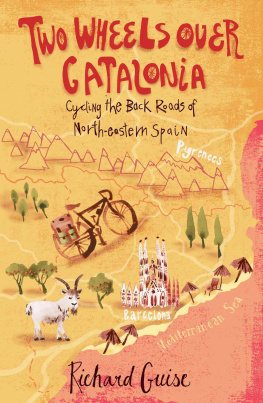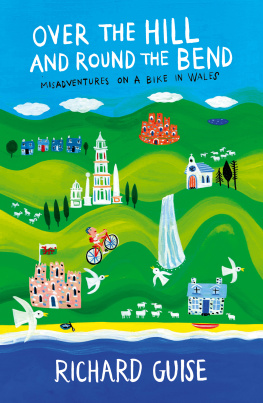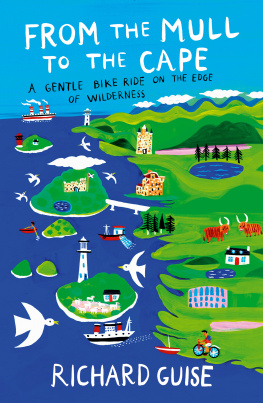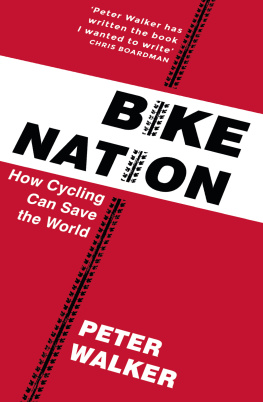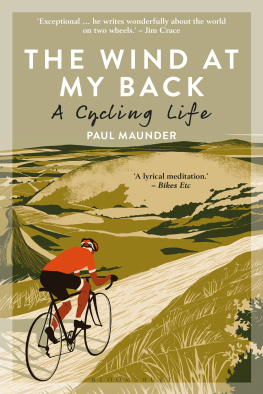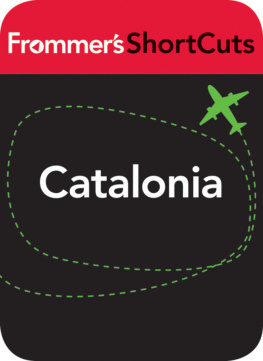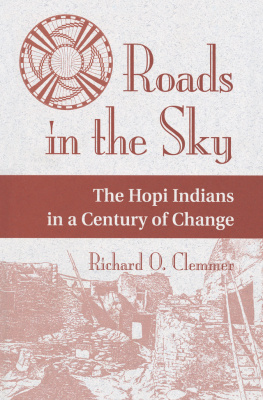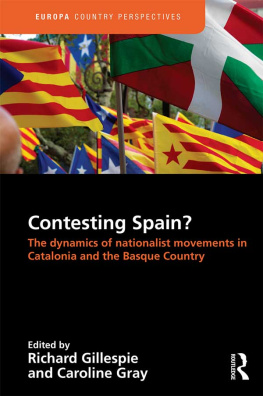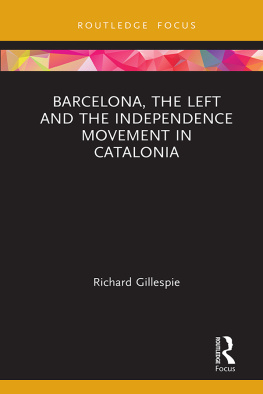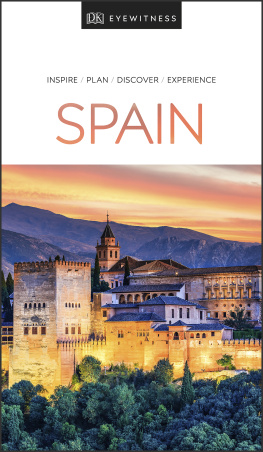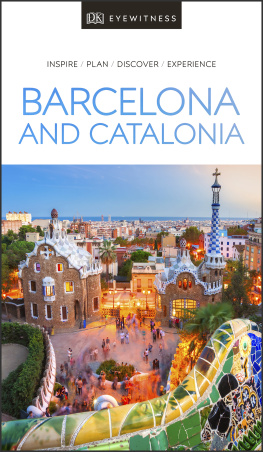TWO WHEELS OVER CATALONIA
Copyright Richard Guise, 2011
Map by Robert Littleford
All rights reserved.
No part of this book may be reproduced by any means, nor transmitted, nor translated into a machine language, without the written permission of the publishers.
The right of Richard Guise to be identified as the author of this work has been asserted in accordance with sections 77 and 78 of the Copyright, Designs and Patents Act 1988.
Condition of Sale
This book is sold subject to the condition that it shall not, by way of trade or otherwise, be lent, re-sold, hired out or otherwise circulated in any form of binding or cover other than that in which it is published and without a similar condition including this condition being imposed on the subsequent publisher.
Summersdale Publishers Ltd
46 West Street
Chichester
West Sussex
PO19 1RP
UK
www.summersdale.com
eISBN: 978-0-85765-289-8
Substantial discounts on bulk quantities of Summersdale books are available to corporations, professional associations and other organisations. For details contact Summersdale Publishers by telephone: +44 (0) 1243 771107, fax: +44 (0) 1243 786300 or email: .
PERMISSIONS:
p. 20, excerpt from A Piper in Brazil by James D. Faulkner (2006, James Donal Faulkner) is reproduced by kind permission of James Faulkner. (The menu quoted in the first chapter of this book was first published there.)
Excerpts from A Handbook for Travellers in Spain by Richard Ford (1855, John Murray) are reproduced without permission as it is out of copyright and in the public domain.
Excerpts from Fabled Shore by Rose Macaulay ( Rose Macaulay, 1949) are reproduced by kind permission of PFD (www.pfd.co.uk) on behalf of the estate of Rose Macaulay.
To Julie, for her support, her tolerance and her marmalade
Richard Guise is the author of Over the Hill and Round the Bend and From the Mull to the Cape. He is based in Quorn, Leicestershire, and spends part of the year in Llan, Catalonia.
Contents
Portbou to Llan
Llan to Cadaqus
Cadaqus to L'Escala
L'Escala to Sant Antoni de Calonge
Sant Antoni de Calonge to Malgrat de Mar
Malgrat de Mar to Barcelona
Barcelona to El Prat de Llobregat
El Prat de Llobregat to Calafell
Calafell to Cambrils
Cambrils to Sant Carles de la Rpita
Sant Carles de la Rpita to Prat de Comte
Prat de Comte to Tortosa
Tortosa to Ripoll
Ripoll to Olot
Olot to Girona
Girona to Sant Feliu de Guxols
Acknowledgements
For creative ideas, thanks to Jim Faulkner, Narcs Gens, Jordi Pellej, Nuri Pellej and Mireia Sanuy. For reviews and comments, thanks to Jan Baker, Tom Baker, Jude Gourd, Tim McEwen, Chris Owen and Isabel Ruiz de Conejo. For help in flora identification, thanks to Mary Thomas. For a comprehensive and detailed review of all things Catalan, thanks to Montserrat Castelltort. For invaluable help at the sharp end, thanks to Anna, Jennifer and Lucy at Summersdale. And for inspiration and support way beyond the call of duty, thanks especially to Julie Challans.
Despite all the reviews, any errors remaining in this book are of course my own responsibility.
A Note From the Author
Catalan and Spanish
Many geographical names in Catalonia are different in Catalan and Spanish; for example, Girona (Catalan) and Gerona (Spanish) or Ebre (Catalan) and Ebro (Spanish). Throughout this book I use the Catalan versions, unless there's a different English equivalent, for example Aragon rather than Arag.
As for other local vocabulary, some is in Catalan and some Spanish, depending on the context that's just the way it is in Catalonia. I don't indicate systematically which is which.
Some basics:
The Catalan for Catalonia is Catalunya.
The Catalan for Catalan is catal/catalana.
The Catalan for Spain is Espanya.
The Catalan for Spanish (= of Spain) is espanyol/espanyola.
The Catalan for Spanish (the language) is castell.
The Spanish for Catalonia is Catalua.
The Spanish for Catalan is catal/catalana.
The Spanish for Spain is Espaa.
The Spanish for Spanish (= of Spain) is espaol/espaola.
The Spanish for Spanish (the language) is castellano or espaol.
Personal Names and Accommodation Names
Some of the personal names used in this book are not their real ones. Any names mentioned for accommodation and eateries, however, are the real ones.
Day 1
Like That?
Portbou to Llan
It was a calm, misty-blue morning. Eerily calm for a spring that followed the most violent of winters.
Two sheets of identical blue were divided by a distant grey line. Since the lower sheet ended abruptly 200 metres beneath my feet, it must have been the Mediterranean Sea and the grey line the horizon.
Standing alone at the dead end of a dusty track, I strained to hear any sound but the call of a gently wheeling gull, eventually picking out some thin voices, too far away for me to detect their language. After a minute or two the limp, white sail of a small yacht, perhaps a kilometre out to sea, drifted from behind the sharp, black rocks of Punta del Falc to my right, the south. The voices must have been carried from there on the gentlest of breezes, across the marble-still water.
The track had been unsignposted but might have pointed to 'End of Pyrenees', 'End of France', 'End of Spain' or 'End of Catalonia'. For this was why I was here. And why Benny the bike was here, too, leaning against one of the two green water tanks that evidently justified the track's existence. The ridge of short, spiky bushes running parallel to the track carried along its crest the frontier between France and Spain before this invisible boundary plunged down the vertical cliff face into the sea, and so this weedy spot, just in France, was the nearest I could get to the top-right corner of Catalonia, Spain's north-easternmost region.
Catalonia is a right-angled triangle, its right angle at the north-west, high up in the Pyrenees, and its 300kilometre hypotenuse forming the region's coastline. Three hundred kilometres if it were a straight line, that is. My objective was to cycle this coast before turning inland to sample the Catalan interior.

